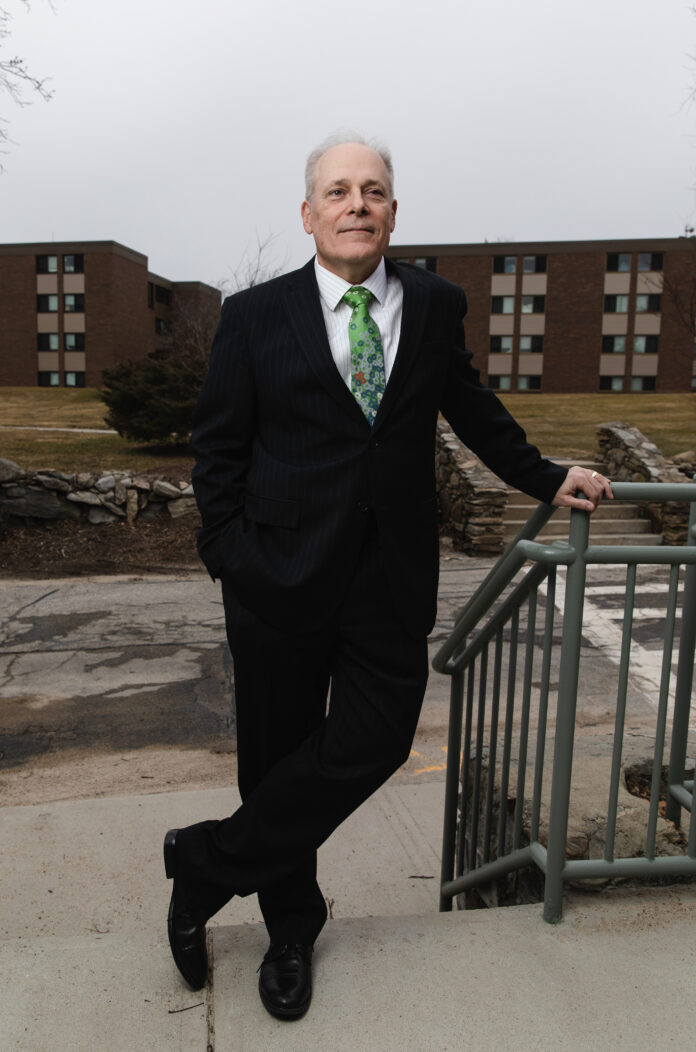SMITHFIELD – Trade relationships between the United States and China and how they will operate under the Biden administration, resetting trade relations between the U.S. and European allies, and responding to a crisis and creating resiliency, are among the many discussions the John H. Chafee Center for International Business will have with attendees during its annual World Trade Day, set to be held May 26 from 8 a.m. to 2 p.m.
The Chafee Center’s signature annual event, which brings local and national industry professionals together at Bryant University to discuss global trade and other topics related to international business, is restarting this year after having to cancel last year’s event due to the COVID-19 pandemic. Chafee Center Director Mark S. Murphy told Providence Business News Tuesday that at this time last year, the Chafee Center couldn’t see how the event could be held because a lot of companies weren’t sending employees out traveling and the technology to help connect many people at once on a virtual platform wasn’t readily available.
This year’s fully virtual World Trade Day, themed “The Future of Global Trade: Changes, Challenges and Opportunities,” will utilize a platform managed by Accelevents, which will allow for workshops, networking opportunities and for people with similar interests to connect with one another for the first time. Murphy said having a digital platform for World Trade Day will allow participants from all over the globe be part of the event, which he says is a “real important piece” of the networking component.
“If you’re virtual, you can network with someone in Taiwan or Germany or Australia,” he said. “I think it gives us a broader reach than before.”
Chafee Center officials will measure out how this year’s virtual event plays out before discussing whether or not the 2022 World Trade Day will return in person in some capacity, Murphy said. He said this year’s event will be a learning experience and the Chafee Center will “try to learn a much as we can” from it.
The event will have two keynote sessions, as well as workshops and networking opportunities for attendees to participate in. One session will focus on trade relationships between the U.S. and foreign countries – most notably China and the members of the European Union. The other session will highlight how global supply chains, trade shows and industry professionals are responding to the COVID-19 crisis.
Along with the challenges the ongoing pandemic has posed for international trade, tariffs imposed by the U.S. on other countries are also factoring in on how global trade proceeds. Additionally, relations between the U.S. and China are off to a difficult start with the Biden administration.
The discussion “U.S.-China: What will the trade relationship look like in the Biden administration?” will explore if trade could be one area where improvements in the U.S.-China relationship are possible for the current presidential administration. Amy Celico, a partner with Albright Stonebridge Group, will speak about the topic at the event.
Murphy said the tariffs are not going to be reversed instantaneously and there is still uncertainty about the future of trade.
“Our programming is designed to explore those [topics] as much as we can,” Murphy said. “It’s going to be a challenge to understand what is going to happen down the road.”
Among other challenges Murphy said need to be discussed is how the Ever Given cargo ship that blocked the Suez Canal for multiple days will impact global trade for the foreseeable future. The blockage caused many cargo ships to not use the vital trading route, holding up world trade, and Murphy said it cost many businesses “a lot of money as a result.”
“If they haven’t paid for it now, they will down the road,” he said. “So, the expectations and the routes that are being taken for global commerce are being reexamined. It’s the supply chains; it’s the regulatory environments and the politics of it. It’s a lot more than just the pandemic.”
One of World Trade Day’s presentations will be an update on U.S. trade policy, delivered by Sirat Attapit, the U.S. Office of the Trade Representative’s assistant U.S. trade representative for intergovernmental affairs.
Another discussion will be on global marketing and how trade shows will be held in a post-COVID-19 world. UFI Global Association of the Exhibition Industry CEO Kai Hattendorf will discuss what role will trade shows and exhibitions play, how will digital operations drive their development and how might trade show attendees feel safe when returning to shows.
Murphy said trade missions can be done virtually, as well as in person, because missions allow individuals to connect with in-country consultants, which in the end helps local businesses match with other companies for them to do business with. He also said that he won’t be surprised if there is a continuation of trade missions having a virtual aspect to them going forward.
Trade shows, however, are a little bit more difficult to conduct virtually, Murphy said. He said he’s not sure what the future will bring in terms of what trade shows will look like after the pandemic, but international marketers will share their thoughts on the topic for business leaders and project how to look forward.
“It’s an ongoing evolution of what the tools are there for international marketing,” Murphy said.
James Bessette is the PBN special projects editor, and also covers the nonprofit and education sectors. You may reach him at Bessette@PBN.com. You may also follow him on Twitter at @James_Bessette.













